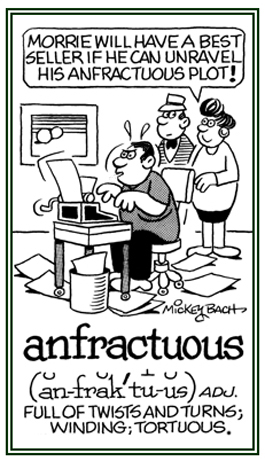anfractuous
(adjective), more anfractuous, most anfractuous
1. Characterized by being full of twists and turns: The
anfractuous roads were full of bends and angles that made it difficult for Karl and Ingrid to reach their summer cottage in the mountains.
2. Etymology: from Latin
anfractuous, from
anfractus, "a winding, a turning, a bending around"; from
ambi-, "around" +
fractus a form of
frangere, "to break".
 © ALL rights are reserved.
© ALL rights are reserved.
Go to this Word A Day Revisited Index
so you can see more of Mickey Bach's cartoons.
atmospheric refraction
(s) (noun) (no pl)
1. The light passing through the Earth's atmosphere:
Atmospheric refraction includes both astronomical refraction and terrestrial refraction.
2. An apparent upward displacement of celestial objects relative to the horizon as light from them is bent toward the vertical by the decreasing density with altitude of the Earth's atmosphere:
Atmospheric refraction is greatest for objects on the horizon and negligible at elevations higher than about 45 degrees.
The angular difference between the apparent zenith distance of a celestial body and its true zenith distance is produced by refraction effects as the light from the body penetrates the atmosphere.
Any refraction caused by the atmosphere's normal decrease in density with height.
Near surfaces on the Earth, those within a few meters or so, are usually dominated by temperature gradients.
conchifragous
(adjective), more conchifragous, most conchifragous
A reference to animals that can break shells so they can eat the shellfish that are in them.
diffract
(verb), diffracts; diffracted; diffracting
To undergo or cause to experience the bending and scattering of wavelengths of light or other radiation as it passes around obstacles or through narrow slits.
diffraction
(s) (noun), diffractions
(pl)
1. Any redistribution in space of the intensity of waves that results from the presence of an object causing variations of either the amplitude or phase of the waves: Diffraction is a phenomenon of all electromagnetic radiation, including radio waves; microwaves; infrared, visible, and ultraviolet light; and
X-rays.
2. Etymology: from French diffraction or directly from Modern Latin diffractionem, diffractio, a noun of action from the past participle stem of Latin diffringere, "to break in pieces"; from dis-, "apart" + frangere, "to break".
diffractive
(adjective), more diffractive, most diffractive
Referring to something that undergoes or causes something to undergo a process by which a beam of light or other system of waves are spread out as a result of passing through a narrow opening or across an edge, typically accompanied by interference between the waveforms that are produced.
diffractively
(adverb), more diffractively, most diffractively
A reference to the bending of waves; especially, sound and light waves, around obstacles in their path.
effraction
(s) (noun), effractions
(pl)
1. The breaking into a house, a store, etc., by strong physical force; burglary.
2. In medicine, a breaking of a bone that results when part of the skeleton breaks the surface of the skin.
effractor
(s) (noun), effractors
(pl)
Someone who makes a forcible entry into a house, a store, etc.: Cory saw an effractor who was breaking into his neighbor's house so he called the police who caught the burglar.
electron diffraction
(s) (noun), electron diffractions
(pl)
The change in the directions and intensities of a group of waves of electrons when they pass through crystalline matter:
Electron diffraction is useful in the study of the structures of materials.
Electron diffraction refers to the bending of electromagnetic waves as they pass around corners or through holes smaller than the wavelengths of the waves themselves.
The occurrence or the technique of producing electron diffractions through the incidence of electrons on matter.
The bending of an electron stream which occurs when the electron diffraction travels through a medium; such as, very thin metal foil.
electron diffractograph
(s) (noun), electron diffractographs
(pl)
1. A device which produces an electron-diffraction pattern by focusing an electron beam onto a crystal specimen, allowing the user to examine the crystal structure of the sample.
2. An instrument related to the electron microscope, in which a beam of electrons strikes the sample, showing crystal pattern and other physical attributes on the resulting diffraction pattern: An electron diffractograph is used for chemical analysis, atomic structure determination, etc.
electron-diffraction analysis, electron diffraction analysis
(s) (noun); electron-diffraction analyses, electron diffraction analyses
(pl)
1. The study of crystal structure by electron-diffraction methods.
2. The diffraction of electrons when they pass through crystalline matter, useful in the study of the structure of materials.
3. An examination of solid surfaces by observing the diffraction of a stream of electrons on the surfaces.
A diffraction is the bending or spreading out of waves; such as, of sound or light, as they pass around the edge of an obstacle or through a narrow opening as when light passes sharp edges or goes through narrow slits and the rays are deflected and produce fringes of light and dark bands.
electron-diffraction camera, electron diffraction camera
(s) (noun); electron-diffraction camera, electron diffraction camera
(pl)
1. A camera used to obtain a photographic record of the position and intensity of diffracted beams which may be produced when a specimen is irradiated by a beam of electrons.
2. A special evacuated camera equipped with the means for holding a specimen and bombarding it with a sharply focused beam of electrons.
A cylindrical film placed around a specimen and which records the electrons that might be scattered or diffracted by it.
flux refraction
(s) (noun), flux refractions
(pl)
An abrupt change in direction of magnetic flux lines at the interface between two materials having different magnetic permeabilities.
Fortuna vitrea est, tum quum splendet, frangitur. (Latin proverb)
Translation: Fortune is of glass; she glitters just at the moment of breaking.
Related break, broken-word units:
clast-;
rupt-.


